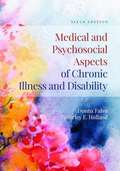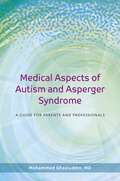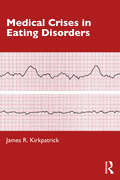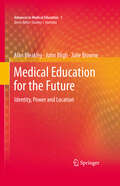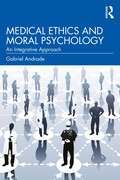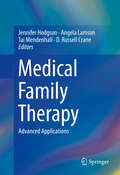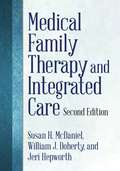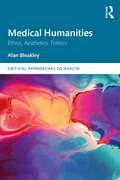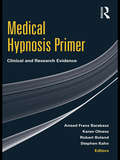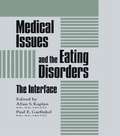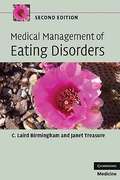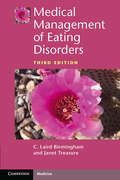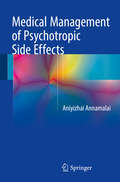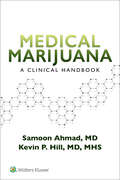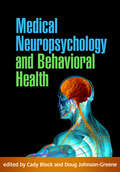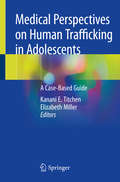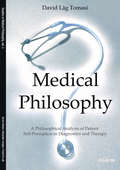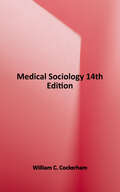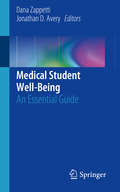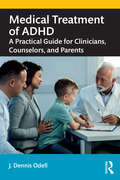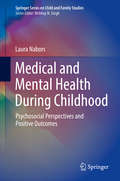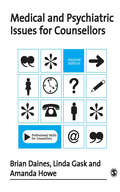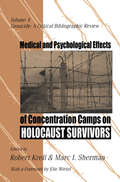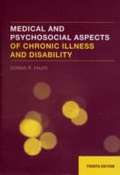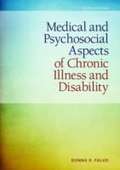- Table View
- List View
Medical And Psychosocial Aspects Of Chronic Illness And Disability
by Donna R. Falvo Beverley E. HollandMedical and Psychosocial Aspects of Chronic Illness, Sixth Edition is intended to teach students, counselors and other medical professionals working with the chronically ill and disabled how to better understand the manifestations of common chronic illnesses and the disabilities among their clients.
Medical Aspects of Autism and Asperger Syndrome: A Guide for Parents and Professionals
by Mohammad GhaziuddinPeople with autism are at a higher risk of having additional medical conditions, so increased care should be taken to ensure any other needs are detected early and effectively managed. This book is the perfect aid for doing so, providing detailed information on the range of possible further conditions, including epilepsy, eating disorders or genetic conditions. Written for both parents and practitioners, including students, it shows how these medical conditions can be identified, and explains the range of possible treatments that are available that may improve the quality of life of the affected person.
Medical Crises in Eating Disorders
by James R. KirkpatrickMedical Crises in Eating Disorders provides medical clinicians as well as others with an acute awareness of the critical and potentially lethal medical outcomes they may have to face when managing those with eating disorders. This book shares multiple blended patient stories that cover a wide range of medical crises and present a realistic clinical-like experience. The reader will gain insight into the most threatening medical risks described in medical terms and many of the behaviors utilized by those with eating disorders that lead to most of the critical, including lethal, medical risks. Non-eating disorder causes of risk are also discussed throughout the book. Examples of electrocardiogram images, echocardiogram reports, and blood and urine results in addition to hospital chart vital records and excerpts from official coroner’s documents help augment the learning experience. This innovative book is a necessary reference for those who manage the medial concerns of those with eating disorders, including critical care physicians, internists, pediatricians, psychiatrists, and family physicians. As well, psychologists, counselors, dietitians, nurse practitioners and social workers will benefit from an increased awareness of critical medical risks.
Medical Education for the Future
by Alan Bleakley John Bligh Julie BrowneThe purpose of medical education is to benefit patients by improving the work of doctors. Patient centeredness is a centuries old concept in medicine, but there is still a long way to go before medical education can truly be said to be patient centered. Ensuring the centrality of the patient is a particular challenge during medical education, when students are still forming an identity as trainee doctors, and conservative attitudes towards medicine and education are common amongst medical teachers, making it hard to bring about improvements. How can teachers, policy makers, researchers and doctors bring about lasting change that will restore the patient to the heart of medical education? The authors, experienced medical educators, explore the role of the patient in medical education in terms of identity, power and location. Using innovative political, philosophical, cultural and literary critical frameworks that have previously never been applied so consistently to the field, the authors provide a fundamental reconceptualisation of medical teaching and learning, with an emphasis upon learning at the bedside and in the clinic. They offer a wealth of practical and conceptual insights into the three-way relationship between patients, students and teachers, setting out a radical and exciting approach to a medical education for the future. "The authors provide us with a masterful reconceptualization of medical education that challenges traditional notions about teaching and learning. The book critiques current practices and offers new approaches to medical education based upon sociocultural research and theory. This thought provoking narrative advances the case for reform and is a must read for anyone involved in medical education." - David M. Irby, PhD, Vice Dean for Education, University of California, San Francisco School of Medicine; and co-author of Educating Physicians: A Call for Reform of Medical School and Residency "This book is a truly visionary contribution to the Flexner centenary. It is compulsory reading for the medical educationalist with a serious concern for the future - and for the welfare of patients and learners in the here and now." Professor Tim Dornan, University of Manchester Medical School and Maastricht University Graduate School of Health Professions Education.
Medical Ethics and Moral Psychology: An Integrative Approach
by Gabriel AndradeMedical Ethics and Moral Psychology: An Integrative Approach is a pioneering book which provides a comprehensive exploration of the ethical challenges in contemporary healthcare. Seamlessly combining insights from medical ethics and moral psychology, this interdisciplinary work illuminates critical issues that have become particularly relevant in recent times, especially in the context of culture wars.This integrative approach enables readers to gain a deeper understanding of how moral decision-making is influenced by cognitive biases, societal attitudes, and philosophical frameworks. The book meticulously examines the complexities of vaccine mandates, addressing psychological resistance and conspiracy theories, while discussing self-defense arguments in abortion debates and the cognitive dissonance surrounding fetal personhood. It further provides a balanced analysis of euthanasia by navigating the nuanced distinctions between killing and letting die, and it interrogates the ethical implications of Assisted Reproductive Technologies amidst the clash of technological advancement and traditional values.By highlighting issues of justice in healthcare resource distribution, including systemic racism and equity, this work also equips readers with the tools necessary to engage thoughtfully with contemporary ethical dilemmas and the moral psychology aspects that contextualize them, fostering informed decision-making and the development of just healthcare policies with greater sensitivity and depth.Drawing on insights from psychology, sociology, anthropology and history to offer a comprehensive understanding of the complex dynamics shaping medical ethical decision-making, this is ideal reading for students and researchers in moral psychology, medical ethics, philosophy and public health. It is also designed for healthcare professionals, ethicists and policymakers.
Medical Family Therapy
by Jennifer Hodgson Angela Lamson Tai Mendenhall D. Russell Crane"High praise to Hodgson, Lamson, Mendenhall, and Crane and in creating a seminal work for systemic researchers, educators, supervisors, policy makers and financial experts in health care. The comprehensiveness and innovation explored by every author reflects an in depth understanding that reveals true pioneers of integrated health care. Medical Family Therapy: Advances in Application will lead the way for Medical Family Therapists in areas just now being acknowledged and explored. " - Tracy Todd, PhD, LMFT, Executive Director of the American Association for Marriage and Family Therapy Integrated, interdisciplinary health care is growing in stature and gaining in numbers. Systems and payers are facilitating it. Patients and providers are benefitting from it. Research is supporting it, and policymakers are demanding it. The emerging field of Medical Family Therapy (MedFT) is contributing greatly to these developments and Medical Family Therapy: Advanced Applications examines its implementation in depth. Leading experts describe MedFT as it is practiced today, the continuum of services provided, the necessary competencies for practitioners, and the biological, psychological, social, and spiritual aspects of health that the specialty works to integrate. Data-rich chapters model core concepts such as the practitioner as scientist, the importance of context in health care settings, collaboration with families and communities, and the centrality of the relational perspective in treatment. And the book's wide-spectrum coverage takes in research, training, financial, and policy issues, among them: Preparing MedFTs for the multiple worlds of health care Extending platforms on how to build relationships in integrated care Offering a primer in program evaluation for MedFTs Ensuring health equity in MedFT research Identifying where policy and practice collide with ethics and integrated care Recognizing the cost-effectiveness of family therapy in health care With its sophisticated insights into the current state - and the future - of healthcare reform, Medical Family Therapy: Advanced Applications is essential reading for researchers and practitioners in the fields of clinical psychology, counseling, family therapy, healthcare policy, psychiatric nursing, psychiatry, public health, and social work.
Medical Family Therapy and Integrated Care (Second Edition)
by Susan H. Mcdaniel Jeri Hepworth William J. DohertyThe field of medical family therapy has grown by leaps and bounds since the authors' bestselling Medical Family Therapy: A Biopsychosocial Approach to Families With Health Problems was published in 1992. In that book, the authors sought to bridge the gap between mental and physical health by introducing a systems-based approach that unites unites physicians, psychologists, family therapists, social workers, nurses, counselors, and therapists of all theoretical orientations in working with families across a wide range of professional settings. In this thorough revision and update of their classic text, the authors describe the impact of recent economic and structural changes in health care on the role of the medical family therapist. They describe how medical and mental health providers can learn to speak the same language, whether they collaborate in outpatient therapy, co-location settings, community health centers, or fully-integrated health systems. They also take into account exciting new advances in fertility treatments and genomic medicine, and assess the medical family therapist's role in navigating the unique conflicts that can arise in families dealing with these and similar issues.
Medical Humanities: Ethics, Aesthetics, Politics (Critical Approaches to Health)
by Alan BleakleyThis ground-breaking book sets out a fresh vision for a future medical education by providing a radical reconceptualisation of the purposes of medical humanities through a lens of critical health psychology and liberatory pedagogy. The medical humanities are conceived as translational media through which reductive, instrumental biomedicine can be raised in quality, intensity, and complexity by embracing ethical, aesthetic, political, and transcendental values. This translation occurs through innovative use of metaphor. A note of caution is offered – that the medical humanities too can be instrumental and reductive if not framed well. Drawing on major theorists such as Michel Foucault and Jacques Rancière and bringing together insights from diverse but inter-related fields, Bleakley focuses on the "ills" of contemporary biomedicine and medical education, and the need for reconceptualisation, which – it is argued – the translational medical humanities have the potential to accomplish. Current instrumental approaches to medical humanities, embracing communication skills training and narrative-based medicine, have failed to address the chronic symptoms suffered by medicine. These include resort to closed, functional systems thinking rather than embracing dynamic, complex, open, and adaptive systems thinking; lack of democratic habits in medical culture, compromising patient safety and care; the production of insensibility rather than deepening of sensibility in medical education; a lack of attention to ethics, aesthetics, and politics where the instrumental is privileged; and a lack of critical reflexivity in revisioning habitual practices. Through persuasive argument, Bleakley sets out a more radical manifesto for the role the arts and humanities might play in medical/healthcare education and offers a new approach based on curriculum process rather than syllabus content, to recuperate aesthetic sensibilities, discernment, and affect in medicine. The book will appeal to medical and healthcare educators, medical and health humanities scholars, engaged clinicians, social scientists drawing on critical theory, and arts and humanities practitioners engaging with medical and healthcare themes.
Medical Hypnosis Primer: Clinical and Research Evidence
by Arreed Franz BarabaszThis brief Primer, assembled by top recognized hypnosis authorities, briefly presents the basic concepts of modern medical hypnosis and encourages mental health care practitioners to learn how to use hypnosis as an adjunct to standard medical care. It also lays the groundwork for the teaching and practice of hypnosis as part of the required syllabus for every medical and nursing school as well as graduate programs in clinical and counseling psychology. Medical Hypnosis Primer goes far in advancing the medical and factual aspects of this still greatly misunderstood field, and is of great value to practitioners, teachers, and students.
Medical Issues And The Eating Disorders: The Interface (Eating Disorders Monographs #No.7)
by Allan S. Kaplan Paul E. GarfinkelFirst published in 1993. Routledge is an imprint of Taylor & Francis, an informa company.
Medical Management of Eating Disorders
by Janet Treasure C. Laird BirminghamEating disorders are known to affect between 1 and 4% of all women, and a smaller proportion of men. This text is designed to provide all health professionals with the practical information they need to treat patients with anorexia nervosa and related eating disorders. A user-friendly structure allows the reader to access information on the basis of physical complaint. The book is divided into five sections, each consisting of a case, discussion of the topic and a summary of key points. For the second edition, sections have been added on Munchausen's syndrome, the medical risk of death, ruminating, Superior Mesenteric Artery Syndrome, shoplifting, substance use, and patient self-help. The text is supplemented with diagnostic color photographs of important physical manifestations of eating disorders. The text is suitable for all health care professionals involved in eating disorder management, with special information provided for general practitioners, nursing staff, family carers and nutritionists.
Medical Management of Eating Disorders: A Practical Handbook For Healthcare Professionals
by Janet Treasure C. Laird BirminghamNow in its third edition, the Medical Management of Eating Disorders is the definitive text on the diagnosis and general management of patients with anorexia nervosa, bulimia nervosa, binge eating disorder and other related eating disorders. Providing up-to-date information and research on world-class treatments, this book helps health care professionals understand how to treat eating disorders and other subsequent medical complications that arise as a result of the patient's disorder. Each chapter begins with 'Study Questions' to focus the reader and put the relevant information into perspective, and concludes with 'Implications for Health Care Professionals' to summarise the key learnings of the chapter. 'Patient Information' sections are also included to give examples of how the topics covered can be presented to patients and families. This text is essential reading for all health care professionals involved in the care and management of patients with eating disorders.
Medical Management of Psychotropic Side Effects
by Aniyizhai AnnamalaiThis book is a practical guide for psychiatrists to use when treating patients for medical issues. Over the past 10-20 years, the number of medications prescribed for psychiatric illnesses has steadily increased, and psychiatric practitioners are frequently called upon to manage medical issues and side effects that result from psychotropic treatment. Covering a wide range of conditions from thyroid disorders to cardiac disease, this book is a helpful resource for understanding common adverse medical effects that occur when psychotropic drugs are administered. Presented in a practical format, each chapter discusses management of a particular medical problem or side effect and then provides a summary and flowchart of the major points highlighted in that chapter. Each chapter contains an overview of key medications causing a particular side effect. The book also includes special topics such as psychotropic prescribing in medical illness and tips on electrocardiographic interpretation. This easy-to-reference book aims to bridge the gap between medicine and psychiatry by elaborating on medical conditions seen in routine outpatient psychiatric practice. It serves as an invaluable tool for mental health providers, nurses, health educators, and pharmacologists alike.
Medical Marijuana: A Clinical Handbook
by Samoon Ahmad Kevin HillWritten by experienced clinicians for practicing physicians and other health care providers, this timely handbook presents today’s available information on cannabis and its uses in all areas of patient care. Medical Marijuana: A Clinical Handbook summarizes what is currently known about the positive and negative health impacts of cannabis, detailed pharmacological profiles of both THC and CBD, considerations for each medical specialty, treatment approaches used by practicing clinicians, and insights into the history of cannabis and the current regulatory environment in the United States. This concise, easy-to-navigate guide is an invaluable resource for physicians and residents, nurse practitioners, pharmacists, and other clinicians who seek reliable clinical guidelines in this growing area of health care.
Medical Neuropsychology and Behavioral Health
by Cady Block Doug Johnson-GreeneIt is increasingly recognized that medical conditions can have a range of neurocognitive, psychosocial, and functional implications, even in the absence of obvious neurological involvement. Filling a gap in the literature, this comprehensive clinical reference reviews current research and provides clear guidelines for assessment and intervention. Chapters organized around major bodily systems--for example, cardiovascular, endocrine, immune/lymphatic--probe neurocognitive impairments associated with prevalent health conditions and their treatments, including coverage of COVID-19. State-of-the-science chapters on lifestyle behaviors and habits explore the neurocognitive impact of sleep and fatigue, nutrition and weight, acute and chronic pain (and the use of opioid analgesics), personality and temperament, and substance misuse.
Medical Perspectives on Human Trafficking in Adolescents: A Case-Based Guide
by Elizabeth Miller Kanani E. TitchenHuman trafficking is an increasingly large issue in medicine, particularly for the adolescent population. The pubertal and neurologic development of early- and mid-adolescence may serves as a foothold for trauma bonds and human trafficking. To date, there are few case studies of human trafficking in the medical literature. More often, these cases are missed, and human trafficking patients are unlikely to disclose their victimization to their physicians for multiple reasons. As a result, physicians fail to ask key questions and fail to notice important red flags for human trafficking. Research shows that this is primarily due to a lack of medical training and awareness and a resultant denial on the part of many physicians that victims of human trafficking present to their clinics or specialties.This book provides clinicians with a case-based guide to scenarios they may encounter in their practice that involve human trafficking. These cases include those involving sex trafficking and labor trafficking; male and female and transgender victims; victims from a range of racial, ethnic, geographic and socioeconomic backgrounds; as well as presentations of adolescent and young adult victims to fields such as adolescent medicine, general pediatrics, neonatology, rheumatology, transplant medicine, and obstetrics-gynecology, in addition to the stereotypical presentations to emergency departments. Each case is followed by a discussion that highlights key aspects of human trafficking in adolescent and young adult patients. These discussions also reference the growing body of research on human trafficking, orient the reader to medico-legal aspects of reporting human trafficking in the adolescent and young adult populations, and feature useful questions, exercises, and resources to promote discussion among those medical professionals who interact with adolescent medicine and young adult patients. Written by physicians, legal advocates and lawyers, Medical Perspectives on Human Trafficking in Adolescents is the definitive guide for all clinicians who care for adolescent patients. It is also a useful resource for mental health professionals and social workers.
Medical Philosophy: A Philosophical Analysis of Patient Self-Perception in Diagnostics and Therapy (Studies in Medical Philosophy #1)
by David Låg TomasiThis innovative book clarifies the distinction between philosophy of medicine and medical philosophy, expanding the focus from the 'knowing that' of the first to the 'knowing how' of the latter. The idea of patient and provider self-discovery becomes the method and strategy at the basis of therapeutic treatment. It develops the concept of 'Central Medicine', aimed at overcoming the dichotomies of Western–Eastern medicine and Traditional–Integrative approaches. Evidence-based and patient-centered medicine are analyzed in the context of the debate on placebo and non-specific effects alongside clinical research on the patient-doctor relationship, and the interactive nature of human relationships in general, including factors such as environment, personal beliefs, and perspectives on life's meaning and purpose. Tomasi's research incorporates neuroscience, psychology, philosophy, and medicine in a clear, readable, and detailed way, satisfying the needs of professionals, students, and anyone who enjoys the exploration of the complexity of human mind, brain, and heart.
Medical Sociology, Fourteenth Edition
by William C. CockerhamThe most thorough major academic textbook available, this classic text presents the most important research studies in the field. The author also integrates engaging first-person accounts from patients, physicians, and other healthcare providers throughout the text. A much greater number of first-person accounts and updated examples are added to the new fourteenth edition. Other updates include: - Coverage of Zika, Ebola, MERS, and updates on other pandemics - Expanded discussion of obesity as a disease - Coverage of the widening gap in life expectancy between the rich and the poor - New information on the decline of life expectancy among American white women, especially those who live in rural counties - New material on biomarkers, gene-environment interaction, and stress - Analysis of the role of the hidden curriculum in medical schools - Exiting the Affordable Care Act
Medical Student Well-Being: An Essential Guide
by Jonathan D. Avery Dana ZappettiThis book tackles the most common challenges that medical students experience that lead to burnout in medical school by carefully presenting guidelines for assessment, management, clinical pearls, and resources for further references. Written by national leaders in medical student wellness from around the country, this book presents the first model of care for combating one of the most serious problems in medicine. Each chapter is concise and follows a consistent format for readability. This book addresses many topics, including general mental health challenges, addiction, mindfulness, exercise, relationships and many more of the important components that go into the making of a doctor.Medical Student Well-being is a vital resource for all professionals seeking to address physician wellness within medical schools, including medical students, medical education professionals, psychiatrists, addiction medicine specialists, hospitalists, residents, and psychologists.
Medical Treatment of ADHD: A Practical Guide for Clinicians, Counselors, and Parents
by J. Dennis OdellThis practical and easily navigable book covers the gamut of issues that need to be understood to provide excellent medical care for those with ADHD. Outside of mental health professionals, those who most often treat ADHD are primary care providers such as family practitioners, pediatricians, nurse practitioners, physician assistants, and school personnel. Based on clinical conversations with patients with ADHD and their families, this book provides concise, useful, up to date information of a practical nature for most, if not all of the problems, associated conditions and questions that arise when an individual has concerns about ADHD. Treatments discussed include a thorough review of medication options, with expected results and side effects, as well as other recommended treatments including a variety of therapeutic modalities, and a review of less commonly considered but important interventions regarding general health, sleep, diet, exercise, and school interventions. Readers will gain an understanding of what ADHD is, practical reviews of the literature that will help in discussion with patients and their families the importance of intervention, and all the resources and options available to provide the best treatment strategies for anyone who has ADHD as well as the commonly associated conditions.
Medical and Mental Health During Childhood
by Laura NaborsThis textbook provides a comprehensive overview of medical and mental illness in children, detailing how psychological, academic, and social functioning can be enhanced - and inherent challenges overcome - in young patients. The volume describes best-practices in depth, including how to ensure accurate diagnosis, developmentally appropriate treatment, and effective coordination between medical and school personnel. It discusses common medical conditions (e. g. , asthma, cancer, diabetes) and mental health conditions (e. g. , autism, ADHD, depression), emphasizing the critical role of health education in promoting optimal outcomes. Topics featured in this text include: Screening and diagnosis practices for children with medical and mental illness. Chronic and condition-related pain in children. Medical fears that may interfere with treatment and positive health behaviors Health education and coping strategies for children. Recommendations for family-directed interventions. Illustrative case studies and review questions. Medical and Mental Health During Childhood is an essential text for graduate students as well as a valuable reference for researchers, professors, and clinicians in clinical child and school psychology, social work, public health, family studies, educational psychology and counseling, health education, and allied disciplines.
Medical and Psychiatric Issues for Counsellors (Professional Skills for Counsellors Series)
by Linda Gask Brian Daines Amanda HowePraise for the First Edition: `An interesting overview of medical and psychiatric issues that may arise for counsellors... readable, lucid and free of jargon. The issues addressed include referral and assessment, ongoing counselling and supervision, medical conditions and their treatment, psychiatric conditions and their treatment, and ethical and legal issues... it raises awareness of some important issues to consider when working with clients with medical and psychiatric conditions′ - British Journal of Guidance and Counselling Medical or psychiatric issues frequently arise during counselling and counsellors need to equip themselves with the knowledge and skills to respond appropriately. Medical and Psychiatric Issues for Counsellors, Second Edition is the perfect guide to this challenging area of practice. It provides a clear introduction to: " the nature of mental illness, " the relationship between mental and physical health and " the role of counselling in relation to both. Highly practical and right up-to-date, this Second Edition examines how to manage medical or psychiatric issues as they emerge, whether during assessment or at a later stage in the counselling process. Guidance is given on: " how to recognise serious mental health problems " the effects of psychiatric drugs " assessement and referral to other services, and " legal and ethical issues. The Second Edition covers changes in the context of counselling practice - particularly in health care settings - such as the use of tools to measure outcomes, evidence-based practice and clinical governance. The common principles of care and working with other professionals are also explored. This Second Edition is essential reading both for counsellors in health care settings and those practising in more general contexts. It is also suitable for all mental health workers needing a clear, practical introduction to working with clients. Brian Daines is an independent practitioner, Clinical Tutor in Psychosexual Medicine at University of Sheffield and a college counsellor. Linda Gask is Professor of Primary Care Psychiatry at University of Manchester and Honorary Consultant Psychiatrist in Salford. Amanda Howe is Professor of Primary Care at the Institute of Health, University of East Anglia.
Medical and Psychological Effects of Concentration Camps on Holocaust Survivors: A Research Bibliography (Genocide Ser. #Vol. 4)
by Robert Krell & Marc I. ShermanThis unique research bibliography is offered in honor of Leo Eitinger of Oslo, Norway. Dr. Eitinger fled to Norway in 1939, at the start of the World War II. He was caught and deported to Auschwitz, where, among others, he operated on Elie Wiesel who has written the foreword to this volume. After the war, Eitinger became a pioneering researcher on a subject from which many shied away. His contributions to understanding of the experience of massive psychological trauma have inspired others to do similar work. His many books and papers are listed in this special volume of the acclaimed bibliographic series edited by Israel W. Charny of The Institute on the Holocaust and Genocide in Jerusalem.In order to acquaint users of this bibliography with the topic, two introductory articles are offered. The first is titled "Survivors and Their Families" and deals with the impact of the Holocaust on individuals. The second, "Psychiatry and the Holocaust," examines the general impact of the Holocaust on the field of psychiatry. Robert Krell writes that in general the psychiatric literature has reflected critically on the survivor due to preconceived notions held by many mental health professionals. For many years, the exploration of victims' psychopathology obscured the remarkable adaptation made by some survivors. The problems experienced by survivors and possible approaches to treatment were entirely absent from mainstream psychiatric textbooks such as the Comprehensive Textbook of Psychiatry throughout the 1960s and 1970s.Fifty years of observations about survivors of the concentration camps and other survivors of the Holocaust (in hiding, as partisans, in slave labor camps) has provided a new body of medical and psychiatric literature. This comprehensive bibliography contains a plethora of references to significant pieces of literature regarding the Holocaust and its effects on survivors. It will be of inestimable value to physicians, psychiatrists, psychologists, and social workers, along with historians, sociologists, and Holocaust studies specialists.
Medical and Psychosocial Aspects of Chronic Illness and Disability (4th Edition)
by Donna R. FalvoMedical and Psychosocial Aspects of Chronic Illness and Diseases, Fourth Edition covers the medical aspects of those conditions commonly encountered by rehabilitation and other health professionals and discusses symptoms, diagnoses, treatments, and prognoses. This Fourth Edition has been completely revised and updated and reflects an approach consistent with the philosophical underpinnings of the International Classification of Functioning, Disability and Health (ICF). New chapters on Conceptualizing Chronic Illness and Disability; Intellectual Disability; and Financing Rehabilitation have been added. In addition, chapters on Psychiatric Disability, Substance Use, and Conditions of the Blood and Immune System have been expanded
Medical and Psychosocial Aspects of Chronic Illness and Disability (Fifth Edition)
by Donna R. FalvoThis book is designed as a reference for non-medical professionals and as a text for students who have little prior medical knowledge but who work with individuals with chronic illness and disability.
